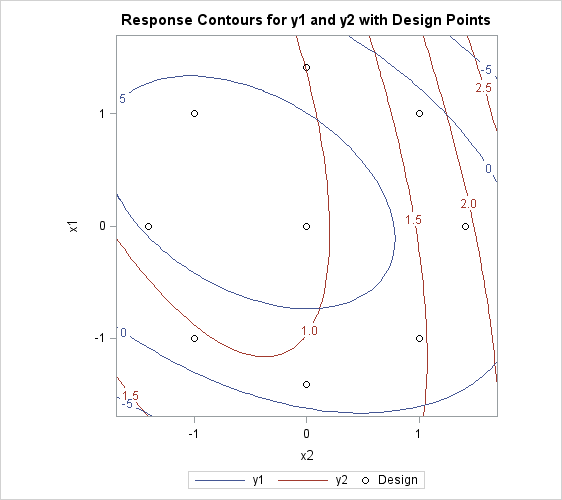The RSREG Procedure
Suppose you have the following data with two factors and three responses, and you want to find the factor setting that produces responses in a certain region:
data a; input x1 x2 y1 y2 y3; datalines; -1 -1 1.8 1.940 3.6398 -1 1 2.6 1.843 4.9123 1 -1 5.4 1.063 6.0128 1 1 0.7 1.639 2.3629 0 0 8.5 0.134 9.0910 0 0 3.0 0.545 3.7349 0 0 9.8 0.453 10.4412 0 0 4.1 1.117 5.0042 0 0 4.8 1.690 6.6245 0 0 5.9 1.165 6.9420 0 0 7.3 1.013 8.7442 0 0 9.3 1.179 10.2762 1.4142 0 3.9 0.945 5.0245 -1.4142 0 1.7 0.333 2.4041 0 1.4142 3.0 1.869 5.2695 0 -1.4142 5.7 0.099 5.4346 ;
You want to find the values of x1 and x2 that maximize y1 subject to y2<2 and y3<y2+y1. The exact answer is not easy to obtain analytically, but you can obtain a practically feasible solution by checking conditions
across a grid of values in the range of interest. First, append a grid of factor values to the observed data, with missing
values for the responses:
data b;
set a end=eof;
output;
if eof then do;
y1=.;
y2=.;
y3=.;
do x1=-2 to 2 by .1;
do x2=-2 to 2 by .1;
output;
end;
end;
end;
run;
Next, use PROC RSREG to fit a response surface model to the data and to compute predicted values for both the observed data
and the grid, putting the predicted values in a data set c:
proc rsreg data=b out=c; model y1 y2 y3=x1 x2 / predict; run;
Finally, find the subset of predicted values that satisfy the constraints, sort by the unconstrained variable, and display the top five predictions:
data d; set c; if y2<2; if y3<y2+y1; proc sort data=d; by descending y1; run; data d; set d; if (_n_ <= 5); proc print; run;
The results are displayed in Figure 81.5. They indicate that optimal values of the factors are around 0.3 for x1 and around –0.5 for x2.
Figure 81.5: Top Five Predictions
| Obs | x1 | x2 | _TYPE_ | y1 | y2 | y3 |
|---|---|---|---|---|---|---|
| 1 | 0.3 | -0.5 | PREDICT | 6.92570 | 0.75784 | 7.60471 |
| 2 | 0.3 | -0.6 | PREDICT | 6.91424 | 0.74174 | 7.54194 |
| 3 | 0.3 | -0.4 | PREDICT | 6.91003 | 0.77870 | 7.64341 |
| 4 | 0.4 | -0.6 | PREDICT | 6.90769 | 0.73357 | 7.51836 |
| 5 | 0.4 | -0.5 | PREDICT | 6.90540 | 0.75135 | 7.56883 |
If you are also interested in simultaneously optimizing y1 and y2, you can specify the following statements to make a visual comparison of the two response surfaces by overlaying their contour
plots:
ods graphics on; proc rsreg data=a plots=surface(overlaypairs); model y1 y2=x1 x2; run; ods graphics off;
Figure 81.6 shows that you have to make some compromises in any attempt to maximize both y1 and y2; however, you might be able to maximize y1 while minimizing y2.

